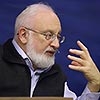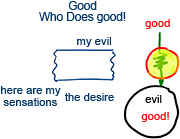 We are approaching a period of time when there will be many unemployed people. Presently, there are two hundred million jobless people in the world. During the next year this number will grow catastrophically. These people represent a huge problem for themselves as well as for society as a whole and for governments; the difficulties range from depression to potential bloody revolutions and wars.
We are approaching a period of time when there will be many unemployed people. Presently, there are two hundred million jobless people in the world. During the next year this number will grow catastrophically. These people represent a huge problem for themselves as well as for society as a whole and for governments; the difficulties range from depression to potential bloody revolutions and wars.
This is why our organization is exploring integral educational opportunities and has prepared a course meant to train people who are jobless. We hope that our course will help them open their hearts to the changing world and will allow them to sense and better understand their personal place among their friends and family, in human society as a whole, in their countries, and within the contemporary world.
We strongly believe that such conversations are indispensable and that without them the world will rapidly roll into a cataclysm. Suppose we have already convinced the governments of countries and the whole world of the need to start teaching this course on a mandatory basis. Let’s imagine that some country approved this project because it valued its practical benefits and didn’t see any other way out. So, here is the first group of around 30-40 unemployed people who received government scholarships to study. What would I tell them at our first meeting to help them identify changes that are happening around them? How would I teach them to understand and rebuild their lives?
First of all, I would say, “I am very glad to meet you. Perhaps you consider your unemployment as a tragic event caused by adverse factors, and perhaps you wouldn’t have come to learn unless you were forced to by these circumstances. But we should view this state as joyful rather than a crisis.”
Let’s imagine that you were brought here not by the hardships you are experiencing, but rather because we all are on the threshold of a happy and joyful new life. For this, we have to understand what’s going on with each of us in particular and with the whole world in general, and discern why it is happening.
Is the situation you are going through a result of some unfortunate mistakes you made? Maybe it is a normal process that you couldn’t avoid? Did you have to go through these troubles because of some inevitable laws of nature? Did they result from a general developmental tendency that will eventually bring us to great results?
We call our situation a “crisis,” but in fact it’s a part of a general, global, integral predicament, which is taking place in the economy, education, culture, science, finances and in all layers of material human life. Actually, the word “crisis” doesn’t have a negative connotation. It signifies a new stage that is similar to birth.
Based on our life experience, we know that transitioning from one state to another is hard because we have to leave our comfort zone whether we are changing jobs or modifying any other sphere of life. Our habits tie us down. Staying within an operating system that works smoothly doesn’t require us to make much effort; this makes us happy because we resist change by nature.
Our ego pushes us to seek reliable and stable order. The transition to something new is always unpleasant. Well, unless we are absolutely sure that it promises a more pleasant future and it is readily attainable. But if it is a difficult and dangerous transition and the future is unclear and unpredictable, then it is a tragic state.
Therefore, let’s see whether our situation is really awful and tragic and we are on the verge of big problems, severe floods, earthquakes, tsunamis, volcanic eruptions, riots, wars, revolutionary coups, and bloodshed in the streets—complete chaos, or is it just a new order and all that is happening to us now is like the birth of this order, which we do not yet see. Can we regard everything around us that forces humanity to make huge efforts and shed sweat as the birth of a new form? And like an infant during the birth process, we are passing through the difficult condition.
Before the delivery, a child grows peacefully inside his mother’s womb, a safe and protected place. Then the birth is triggered by a very “unpleasant” process. The mother feels immense tension and experiences contractions. The child also feels tremendous pressure. They start pushing each other to the extent as if they cannot tolerate being together any more.
The child senses that he has to exit his mother’s womb. If we translate this situation to our feelings, we’d say it is intolerable for this child to stay within his mother’s organism any longer; neither can she hold him within herself. As a result of such mutual repulsion, the process of delivery is initiated and the child is born to a wonderful, bright world that meets him with great love. Thus, he obtains a new life and arrives at a new stage of his existence.
Instead of being a piece of meat weighing several pounds, he stops being a creature that lives inside of somebody else’s organism and turns into a human being! It’s not important that he is still very small and doesn’t understand what’s going on; what matters is that he is born into a new life. It’s very similar to what is happening with us at this time. Our present state is similar to the birth pains of a new world.
[65757]
From KabTV’s “A New Life” Episode #1, 12/27/2011
Related Material:
Global Revolution
Lessons About A New World: Nature, Society, and Man
Integral Education Is A Quick Process
Filed under: Crisis, Education, Integral Upbringing, Society - No Comments →
 In the News (from Reuters): “President Barack Obama formally notified Congress on Thursday that he plans a $1.2 trillion increase in the U.S. debt limit prompting Republicans to level election-year charges that deficits are out of control.
In the News (from Reuters): “President Barack Obama formally notified Congress on Thursday that he plans a $1.2 trillion increase in the U.S. debt limit prompting Republicans to level election-year charges that deficits are out of control.












